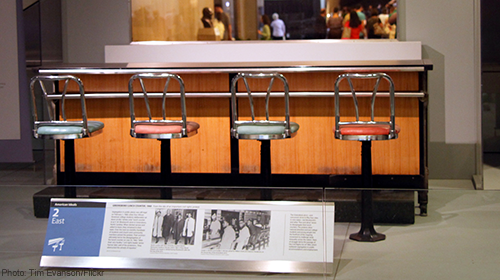
Right now we are in a storm of contested rights, as businesses and institutions across the country ask for express legal permission to use religion to discriminate based on sexual orientation, sex, and gender identity.
Last month, the Supreme Court heightened the storm by ruling that the Hobby Lobby corporation doesn't have to comply with the law and provide its workers with insurance that covers contraception, effectively enshrining into law that religion can be used to discriminate against women.
The decision leaves open the question whether sincerely held religious belief can be used to discriminate in other ways, such as against LGBT people. For example, can businesses invoke religious beliefs as a justification to refuse to bake a cake or rent a reception hall for a same-sex couple?
As we've debated these religious exemptions, the harm to religious objectors caused by not granting these accommodations has been deeply examined. But the question less often asked – and the one the Supreme Court failed to address – is this, "What harm do we cause by granting exemptions to those who are refused?"
Proponents of religious exemptions have argued that they cause little harm, as long as the person can get the services elsewhere.
In a recently published paper, Marvin Lim and I argue that the harm goes far beyond the services denied – the cake or the flowers to celebrate a relationship, for example. The refusal to provide service comes at the expense of dignity of the person who is turned away and ostracized. Hobby Lobby, for example, tells women seeking to use certain contraception, "You are shameful. We won't help you."
Or as the Senate Commerce Committee said in the context of the Civil Rights Act of 1964, "Discrimination is not simply dollars and cents, hamburgers and movies; it is the humiliation, frustration, and embarrassment that a person must surely feel when he is told that he is unacceptable as a member of the public..."
Put another way, the sit-ins at the Woolworth counter weren't about getting a hot dog and a Coke. And David Mullins and Charlie Craig's complaint against Masterpiece Cakeshop isn't just about a cake.
They are about reclaiming the dignity taken away when someone can legally say, "We don't serve your kind here." Or in Hobby Lobby's case, "You are shameful. We won't help you."
Already, those who wish to advance religious exemptions are returning to the stale argument that these exceptions don't cause harm because those who are discriminated against can simply find a cake, a Coke, or contraception elsewhere.
Don't buy it.
Learn more about contraception and other civil liberties issues: Sign up for breaking news alerts, follow us on Twitter, and like us on Facebook.
Stay informed
Sign up to be the first to hear about how to take action.
By completing this form, I agree to receive occasional emails per the terms of the ACLU's privacy statement.
By completing this form, I agree to receive occasional emails per the terms of the ACLU's privacy statement.
